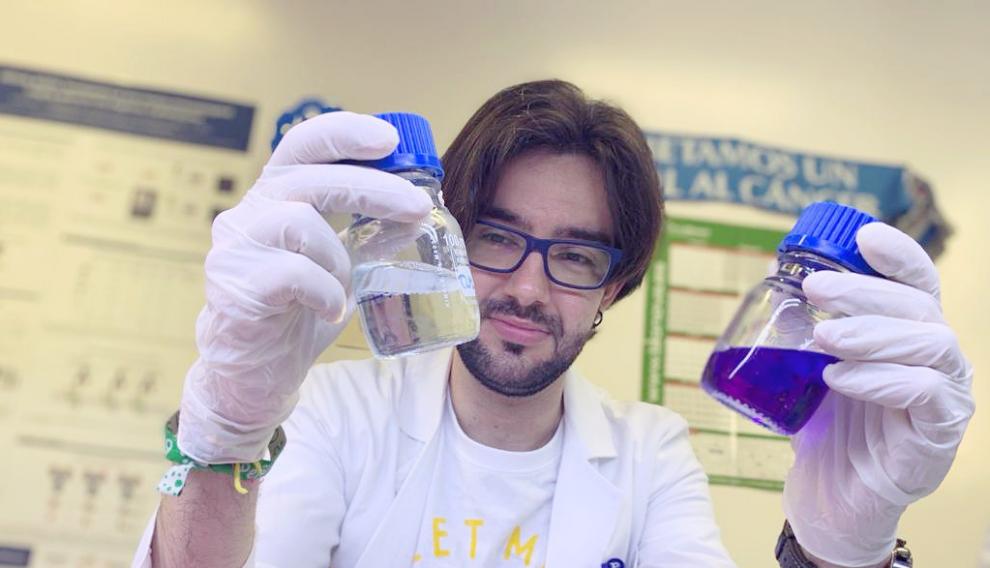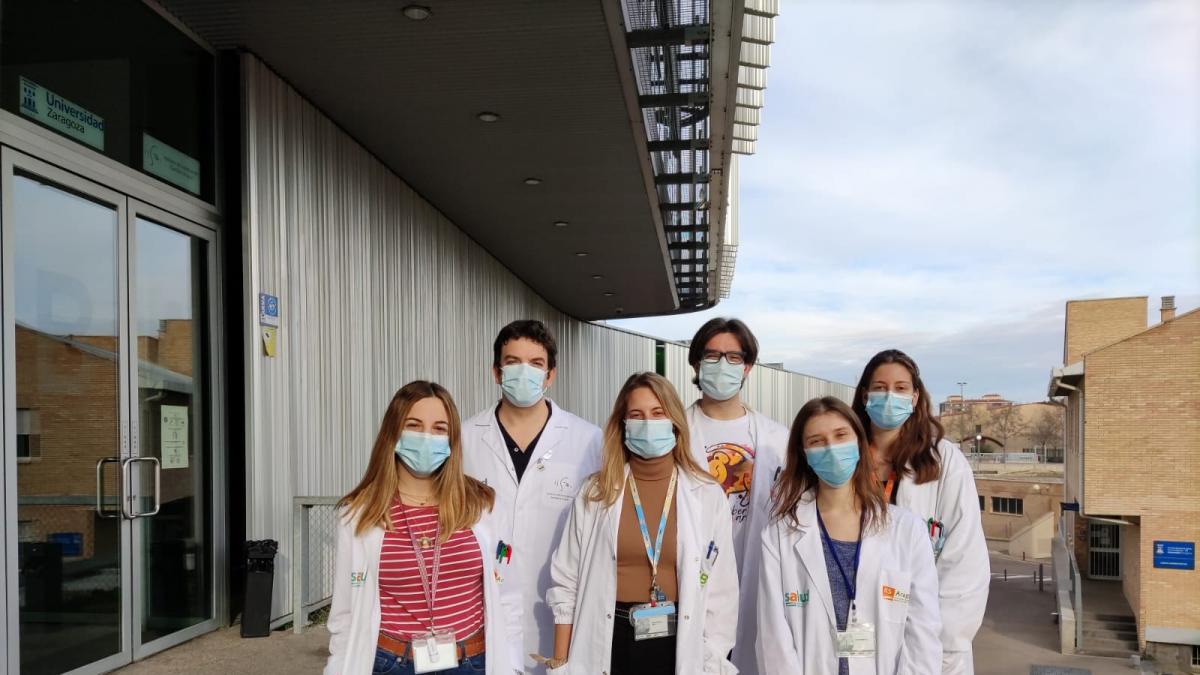The coronavirus pademic has not only brought bad things. In the midst of this bleak ‘loop’ faced by the world’s population, and especially health workers, there are those who have known how to take advantage of the media pull to campaign for the science and give visibility to research, showing that investing in R&D “is more necessary today than ever”.
This is indicated by the Zaragoza researcher Alberto J. Shoemaker, one of the most prominent scientists and ‘influencers’ in Aragon. Your page of Facebook ‘Inoncology investigations‘adds more than 23,000 followers in this social network, where he succeeds with a new “viral challenge” to give visibility to the women of the Metastatic Breast Cancer Association.
“Pablo Motos, do you know what I want? See our friends from the Metastatic Breast Cancer Association dance in El Hormiguero. And for this we accept the challenge that Biodonostia makes us and we dance to Honneypie throughout the laboratory. We want to make people with metastatic breast cancer visible and ask for #MoreInvestigationParaMasVida. I couldn’t be more proud of my students’ commitment to society. ¿Can you help us make it viral?“Jiménez Schuhmacher wrote in this social network.
Like this researcher, the Zaragoza scientist Patricia Sancho, who leads the Metabolism and cancer stem cells group at the Aragon Health Research Institute (IIS), acknowledges that “the good part of all this” it could be “all the visibility” that science is being given in the wake of the pandemic. “Lately everyone is more open to giving us a voice in the media, and that has been noticed a lot. Expert opinion is sought much more, and in terms of the general public we notice an approach that has come in handy thanks to the covid“, he says.
Patricia Sancho and her team of researchers launched in July of last year a crowdfunding campaign that lasted until the end of September, and that was hand in hand with another initiative of sale of solidarity masks with the slogan ‘I support cancer research’. Through ‘crowdfunding’ they managed to raise some 26.000 euros, to which are added the 5.000 from the sale of masks and other “three thousand euros more” that they have received later through donations. “Now with the Internet and social networks, everything is much easier. We are there and they can find us. With the masks it went really well and a lot of people got involved. All the money we earn has given us for a one-year contract, and thanks to that we have another person investigating with us, “says this researcher, who already has almost 600 followers in her Twitter account (@psancholab). Thanks to the “speaker” that these profiles have meant, and also their blog, these researchers from the IIS Aragon They have also made the leap to national media that have echoed their projects. “From there we have been appearing in the media and we remain open to receiving donations through our foundation. The impact of the campaign was such that We were mentioned in ‘Yo dona’, from ‘El Mundo’, and also Rosa Montero in her column of ‘El País’. We are very happy“, confesses this Zaragoza.
–
–
In his opinion, the coronavirus health crisis has notably increased interest in science and in recent months there has been a “very positive approach” between the population and researchers. “On the part of the scientists, it was much more necessary to give us a ‘little touch’ to give more importance to the dissemination, which is essential right now. You have to face the public so they know what you are doing, and vice versa“, emphasizes Sancho, who also highlights the informative work carried out by other accounts that he follows, such as’Wealth of Living (@riquezadevivir)‘, a charity project to help cancer patients, the Aragón Open Laboratory LAAAB (@laaab_es‘), Y associations of women researchers What @Amit, @AragonAmit The @Girls4STEMVLC, who defend equal opportunities and the promotion of new vocations.
Along these lines, the initiative ‘@nomorematildas‘, a campaign to end discrimination against women in science driven by the Association of Women Researchers and Technologists last January, or the campaign ‘Get to know them’, by Aseica, that on the occasion of ‘Day of women and girls in science’, launched a campaign to promote reference female roles in educational centers.
“Thanks to this project we have given many talks in schools so that girls can see that there are women who have made it up there and have a reference to follow. It has been done at the state level and almost 6,000 students have participated. But here in Aragon there is also a lot of movement: a very cool campaign has been that of ‘escaparete scientists‘, with which several stores have been overturned, and the other day They came to the laboratory of another Aragonese women’s association to create profiles for us on Wikipedia they made from scratch, “Patricia enthuses.
Five people work in his laboratory team – all women. That is why she believes that the main problem that all of them face is not a lack of interest or vocations. “The most important ‘handicap’ is that something happens in the middle of the road that we are losing, and in positions of responsibility the balance has turned “, laments this Aragonese scientist, who promises to continue making “noise” to raise funds for research and also make visible the work of other colleagues.
‘A predoc against cancer’
For his part, the Zaragoza researcher Eduardo Ruiz, promoter of the Facebook page ‘A predoc against cancer‘, wants to give visibility with his project in social networks to the new generations that form the “first seat” of the investigation.
Eduardo opened this Facebook page just a year ago, and today it has hundreds of followers in this social network. “I remember that the first outbreaks were taking place in China when I dared to spread the word. My objective was twofold: to defend firm and powerful research in Spain and, on the other, to give value to the predoctoral researchers who carry out the projects “, says Ruiz. As a predoctoral researcher at the AECC at Molecular Oncology group of the IIS Aragón acknowledges that the pandemic has sparked “increased interest” in science, while at the same time the health crisis is having “serious” consequences for some projects.

–
–
“The coronavirus has negatively affected Cancer at the diagnostic level, many treatments and surgical interventions have been stopped and that is perhaps what society is most aware of, because it is closer to it. But everything they see now is the result of having been previously investigated. The effect of the braking we have suffered in research will possibly be seen in a few years“, warns this researcher, who asks not to put aside cancer research.
Eduardo positively values the “enormous” effort that has been devoted to the development of the vaccine and to investigate possible treatments for covid-19, but insists that more resources are needed to get to everything. “There is already talk of a ‘covidification’ of science. Now there is only the coronavirus as an object of investigation, and it really is not. The coronavirus exists and it is more than essential to investigate against the virus, but the rest of diseases, and especially cancer, which affects so many people, we must not forget them either“, he emphasizes.
“Part of the research funds have been derived for COVID studies, with which the funding of many disciplines has been diminished when we had not yet recovered from the previous economic crises”
Of that science ‘covidification’ The researcher Araid Pilar Martín Duque, a scientist at the Aragonese Institute of Health Sciences (IACS) and Vice-Rector for Research of the San Jorge University, who points out that, due to the pandemic, part of the research funds have been derived for studies of the covid-19, with which funding for many disciplines has been diminished, “even though we had not recovered from the lack of funds due to previous economic crises “, he points out.
Like Eduardo, this IACS researcher recognizes that research that existed before the pandemic has been “resentful”, both because of the time the laboratories were stopped during the confinement – and that no progress could be made in the experimentation – and because of the delay in the calls and resolutions of scholarships and financial aid to carry out their work.
“We We had a cancer research project underway that began in January 2020, and without having barely started we had to stop it in March. We are resuming it, but with some delay, “he laments.
Today, Pilar and her team continue to actively work on a project that saw the light of day in full confinement, when many researchers used their previous knowledge to try to help face the advance of the covid. “I had worked a lot in the field of virology, and We requested a project from the Carlos III Health Institute to find faster and more reliable diagnostic tests of the coronavirus, and it was one of the first to be granted, “he says.
If we had to look for the positive side of this pandemic, Pilar agrees with her colleagues that it has served to give science and scientists greater visibility. “For society we have gone from being discreet and having sporadic appearances to being in the media every day, with a very good image and acceptance by the majority of society. The perception of scientists has changed and there is more talk about science in the street, “says this researcher, who, far from being considered an” influencer “(since she is not very active in social networks), is the old-fashioned way: giving talks in schools and participating in volunteer workshops for children in hospitals and conferences. “As a scientific volunteer for the AECC, we organize many activities for children and I try to go to all the ones I can. I think that he Being able to influence these new generations of ‘little scientists’ is the best we can do to have a good pool of future researchers. Personally, I am more about disseminating and influencing with words and actions than with tweets on networks, “he confesses.
– .

